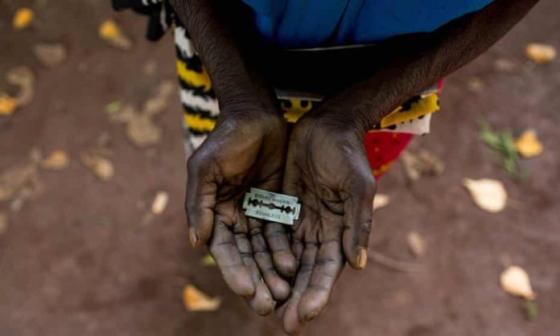Liberia: International Community Lauds Traditional Leaders, Gov’t for Ending FGM

The international community in Liberia welcomes the ban of the practice of female genital mutilation/cutting (FGM/C) in Liberia, as declared by the Chairperson of the National Council of Chiefs and Elders of Liberia (NACCEL), Chief Zanzan Karwor, during the commemoration of the International Day of Zero Tolerance on FGM held in Sonkay Town, Montserrado County on Monday, February 6, 2023.
Chief Zanzan Karwor declared: “By the power vested in me, as Chairman of all the traditional chiefs in 15 Counties, FGM is banned in this country” and he called on chiefs and elders to share the message around the country.
International partners also commend the efforts of the Government and people of Liberia, under the leadership of His Excellency President George Manneh Weah, with the invaluable support of the Vice President, Chief Dr. Jewel Howard Taylor, the mobilization and advocacy of the Ministry of Gender, Children and Social Protection and the Ministry of Internal Affairs, as well as women’s and children’s rights organizations and networks and other human rights defenders who have been campaigning over many years to eliminate FGM and gender-based violence in Liberia.
We recall earlier pronouncements by NACCEL and the Liberian Government, including the Ganta Declaration to suspend FGM/C for one year in 2019 and a further three-year suspension from 2022 to 2025. We welcome this latest call by Chief Zanzan Karwor and NACCEL for a permanent ban of FGM/C.
The international community commends this declaration to ban FGM/C in Liberia as an important step in a journey towards the abolition of FGM/C and other harmful cultural beliefs and practices.
As international partners, we will continue to mobilize support for all initiatives taken by the three branches of Liberia’s government, NACCEL and other actors to abolish FGM/C. We commend the latest holistic and respectful approach that includes continuous engagement with chiefs, zoes, elders, human rights defenders; provision of alternative livelihood opportunities for zoes; and maintaining traditional rites of passage for girls whilst doing no harm, through an approach that underlines ‘initiation without mutilation/cutting.’
We encourage wider collaborations with men and boys, adolescent girls, and other community and national stakeholders, including those in health, education, and other relevant sectors for a multi-level and system-wide approach.
We commend the fact that there are existing laws on which the Government of Liberia can build, including the Children’s Law (2011), the Domestic Violence Law (2019), and Chapter 14 of the Penal Code to protect security of the person, as enshrined in Article 11 of the Liberian Constitution. As international partners, we will continue to support ongoing national efforts to pass a law prohibiting FGM/C as part of our support to the Government of Liberia to domesticate the international legal instruments that it has ratified. These include the Convention on the Elimination of All Forms of Discrimination against Women and its Optional Protocol; the Convention against Torture and Other Cruel, Inhuman or Degrading Treatment or Punishment and its Optional Protocol, and the Convention on the Rights of the Child, the African Charter on the Rights and Welfare of the Child, and The Protocol to the African Charter on Human and Peoples Rights on the Rights of Women in Africa (Maputo Protocol) which requires States to implement legislation against FGM/C, as well as to take other measures such as public education, awareness campaigns, and protection and provision of necessary health services and psychosocial support to survivors.
The United Nations, international partners, and ECOWAS have been supporting the Spotlight Initiative and other programs aimed at eliminating all forms of gender-based violence including harmful practices such as FGM/C.
For more information please contact: lisa.kindervater@unwomen.org; gradiah.bouhussein@un.org
